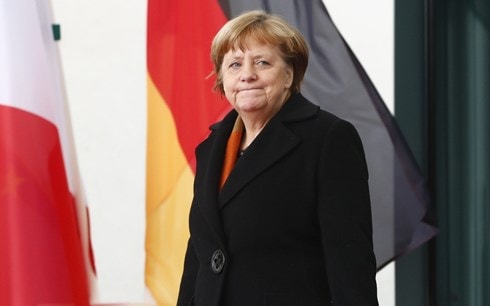Political crisis in Germany: All scenarios are uncertain
Re-elections are not a priority solution in Germany, as all parties fear the rise of the far-right AfD party.
Two months after the federal election, German politics is in a rare situation: no coalition government has been formed, and the political life of Chancellor Angela Merkel, who just a few months ago was praised as an "ageless icon" in modern European politics, is suddenly under serious threat.
 |
| German Chancellor Angela Merkel. Photo: Reuters |
The reason is the failure of coalition bargaining. The Christian Social Union (CSU) refuses to yield to the Greens on immigration and environmental issues, while the Free Democratic Party (FDP) disagrees with the Christian Democratic Union (CDU) on issues related to tax cuts and fiscal policy at the EU level.
The seriousness of these disagreements is shown not only by the fact that the negotiations have lasted for nearly two months and are still deadlocked, but also by the statement of Christian Lindner, Chairman of the FDP: “it is better not to lead than to lead poorly”.
This is a rare political situation in Germany. Since the birth of the Federal Republic of Germany (West Germany) in 1949, the formation of a new government in Germany has never been so difficult.
The German people will face difficult days, even weeks, months, when the executive branch will operate at a standstill, even paralyzed. This will be bad news not only for Germany, but also for Europe. The question, therefore, is what can be the way out of the current crisis?
Re-election is not a priority
On November 20, Angela Merkel met with German President Frank-Walter Steinmeier to find a solution and the subsequent statement of German President Steinmeier showed that the re-election scenario was not a priority.
The reason is that German political tradition has always prioritized the power of Parliament as well as stability and compromise, and if re-election were to occur, it would mean dissolving the newly elected Federal Parliament.
But the biggest reason is that most parties in Germany do not want to hold new elections due to concerns that the far-right, populist AfD party will continue to rise. Opinion polls and political analysis in Germany show that, in the event that Germany has to hold a new federal election, the AfD party will likely win more votes.
In the September 24 election, AfD won 12.6% of the vote. This figure is predicted to increase to 13-14.5% if a new election is held in early 2018. It is a scenario that no other party in Germany wants except AfD.
That is why German President Steinmeier has repeatedly mentioned the seriousness of the current crisis and called on the parties to show their responsibility and return to the negotiating table. But if all calls are in vain, it will be time for Mr. Steinmeier to resort to the Constitution, also known as the Basic Law of Germany.
Article 68 of the German Constitution stipulates that the German President has 21 days to dissolve the Bundestag, the Federal Parliament, and hold an early election. But the problem lies in this: the dissolution of the Bundestag must come from the proposal of the German Chancellor and only after the Bundestag rejects a vote of confidence proposed by the Chancellor.
At this time, Angela Merkel has not been voted by the Bundestag to become Chancellor for a new term, and therefore cannot request the German President to dissolve Parliament.
So if the constitutional weapon must be used, Article 63, Annex 4, will probably come first. This allows the German President to appoint a Chancellor and for the Parliament to vote.
At that time, the person chosen as Chancellor may only receive minority support and the German President will have to decide again: either maintain that person, which means maintaining political instability, or dissolve the Bundestag and hold new elections within 2 months.
The first option, namely maintaining a “minority government”, is not only unprecedented in Germany, but also extremely politically risky.
Alliance, with whom?
In all respects, the best solution for the CDU-CSU as well as Angela Merkel is to find a compromise path to form a coalition government with a majority in Parliament. The question is, with whom?
The FDP walked out of talks on the night of November 19, but a coalition consisting of only the CDU, CSU, and Greens is impossible. The reason is that this alliance would lack the 42 seats needed to form a majority in Parliament, not to mention that CSU members have always openly refused to align themselves with the Greens.
There is another solution, which has been implemented in the past, but is now also considered impossible: re-establishing the “grand coalition” CDU-CSU with the Social Democratic Party SPD.
Since the September election, SPD leaders such as Martin Schulz, Chairman of the SPD, have always affirmed that they will not continue the coalition with the CDU-CSU because with only 20.5% of the vote in September, the SPD has just suffered its worst election defeat since World War II and if the coalition continues, the party is threatened to disappear in the shadow of the CDU.
Ultimately, the only solution left is the failed one: to persuade the FDP to return to the negotiating table and offer new concessions. That may be the key point of the current crisis, because the FDP's current hard-line stance stems from the painful lesson it learned in the past when it formed a coalition with the CDU in 2009, only to fade away and, in the 2013 election, fail to even get the 5% of the vote needed to have a seat in the Federal Parliament.
However, convincing a party that has just proactively walked away from the two-month long bargaining process requires not only a new strategy but also new cards.
Ahead will be an uncertain and extremely unpredictable period, not only for German politics, for the stability of Europe, but also for Mrs. Merkel's political destiny.
If things continue to be deadlocked and a new election is held, Europe may no longer see Angela Merkel as a top leader like it has been for more than a decade./.
According to VOV
| RELATED NEWS |
|---|


